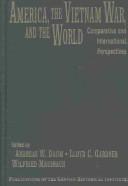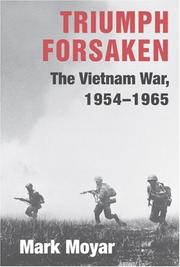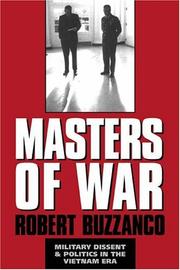| Listing 1 - 6 of 6 |
Sort by
|
Multi
ISBN: 9781107294240 110729424X 9781107294080 1107294088 9781107290242 1107290244 1107287820 9781107287822 1107289718 9781107289710 1107293014 9781107293014 1107291291 9781107291294 9781107031272 1107031273 110728919X 1322521336 Year: 2013 Publisher: Cambridge : Cambridge University Press,
Abstract | Keywords | Export | Availability | Bookmark
 Loading...
Loading...Choose an application
- Reference Manager
- EndNote
- RefWorks (Direct export to RefWorks)
Lieutenant General Sir Thomas Daly was a renowned soldier and one of the most influential figures in Australia's military history. As Chief of the General Staff during the Vietnam War, he oversaw a significant re-organisation of the Army as he fought a war under political and resource restrictions. In this unique biography, Jeffrey Grey shows how Daly prepared himself for the challenges of command in a time of great political upheaval. A Soldier's Soldier examines Daly's career from his entry to Duntroon in the early 1930s until his retirement forty years later, covering the key issues in the development of the Australian Army along the way. Drawing on extensive interview transcripts, the book provides a compelling portrait of Sir Thomas Daly and his distinguished career.
Vietnam --- Australia --- Vietnam War, 1961-1975 --- Generals --- Participation, Australian. --- Daly, Thomas, --- Australia. --- Officers --- History.

ISBN: 0521810485 052100876X 1139052365 9781139052368 9780521810487 9780521008761 Year: 2003 Publisher: Washington, D.C. German Historical Institute
Abstract | Keywords | Export | Availability | Bookmark
 Loading...
Loading...Choose an application
- Reference Manager
- EndNote
- RefWorks (Direct export to RefWorks)
This book presents new perspectives on the Vietnam War, its global repercussions, and the role of this war in modern history. The volume reveals 'America's War' as an international event that reverberated all over the world: in domestic settings of numerous nation-states, combatants and non-combatants alike, as well as in transnational relations and alliance systems. The volume thereby covers a wide geographical range - from Berkeley and Berlin to Cambodia and Canberra. The essays address political, military, and diplomatic issues no less than cultural and intellectual consequences of 'Vietnam'. The authors also set the Vietnam War in comparison to other major conflicts in world history; they cover over three centuries, and develop general insights into the tragedies and trajectories of military conflicts as phenomena of modern societies in general. For the first time, 'America's War' is thus depicted as a truly global event whose origins and characteristics deserve an interdisciplinary treatment.
World history --- anno 1900-1999 --- Arts and Humanities --- History --- Vietnam War, 1961-1975. --- Vietnam War, 1961-1975 --- World politics --- Vietnam Conflict, 1961-1975 --- Vietnamese Conflict, 1961-1975 --- Vietnamese War, 1961-1975
Multi
ISBN: 9789048556397 9048556392 Year: 2023 Publisher: Amsterdam, Netherlands : Amsterdam University Press,
Abstract | Keywords | Export | Availability | Bookmark
 Loading...
Loading...Choose an application
- Reference Manager
- EndNote
- RefWorks (Direct export to RefWorks)
Vietnam, A War, Not a Country explores the conflicting ways in which the American-Vietnamese War has been collectively remembered and represented from the perspective of the war's three primary belligerents: the Vietnamese communists, the South Vietnamese, and the Americans. The book examines how the three different collectives memorialize this traumatizing historical event. Within each of these three groups there exists a number of competing narratives, generating not only a sense of shared meaning and community, but also impassioned social conflict. In order to trace these narratives within each collectivity, the authors develop the concept of arenas of memory, distinct discourses that are tied to specific individuals, organizations, and institutions that advocate specific narratives through specific forms of media. Their analysis leads them to make the case as to whether each of these societies experienced a cultural trauma as a result of the way in which the war is remembered.
Affective and dynamic functions --- Cognitive psychology --- Vietnam --- United States of America --- Collective memory --- Vietnam War, 1961-1975.
Multi
ISBN: 9783031081873 9783031081866 9783031081880 9783031081897 Year: 2022 Publisher: Cham Springer International Publishing
Abstract | Keywords | Export | Availability | Bookmark
 Loading...
Loading...Choose an application
- Reference Manager
- EndNote
- RefWorks (Direct export to RefWorks)
This book tells the story of Agent Orange, its usage and the policies that surround it. Agent Orange contains a contaminant known as TCDD. It was the most widely used defoliant from 1965 - 1970 and became one of three major tactical herbicides used in Vietnam. More than 45 major health studies were conducted with Vietnam veterans from the United States, Australia, New Zealand, and Korea seeking a relationship between veterans' health and TCDD. Allegations of birth defects in the families of Vietnam veterans and the Vietnamese represented a case study in propaganda and deliberate misinformation by the government of Vietnam. The Policies of the US Government implemented by Congress and the Department of Veterans Affairs (DVA) identified 17 recognized associated presumptive diseases that failed the tests of "cause and effect" and common sense. This book tells the story of Agent Orange, its usage, the health studies and those policies from a diverse range of perspectives, delving into science, statistics, history, policy and ethics. It is of interest to scholars engaged in history, political and social philosophy and ethics.
Politics --- Polemology --- Military engineering --- Engineering sciences. Technology --- History --- geschiedenis --- politiek --- technologie --- defensie --- Agent Orange --- Chemical warfare. --- Vietnam War, 1961-1975 --- Toxicology. --- Philosophy of science --- Hazardous substances

ISBN: 9780521869119 0521869110 9780511511646 9780521757638 9780511247224 0511247222 0511511647 0511322887 9780511322884 1281836893 9781281836892 1107171237 0521757630 0511245831 0511245068 9781107171237 9780511245831 Year: 2006 Publisher: Cambridge ; New York : Cambridge University Press,
Abstract | Keywords | Export | Availability | Bookmark
 Loading...
Loading...Choose an application
- Reference Manager
- EndNote
- RefWorks (Direct export to RefWorks)
Drawing on a wealth of new evidence from all sides, Triumph Forsaken, first published in 2007, overturns most of the historical orthodoxy on the Vietnam War. Through the analysis of international perceptions and power, it shows that South Vietnam was a vital interest of the United States. The book provides many insights into the overthrow of South Vietnamese President Ngo Dinh Diem in 1963 and demonstrates that the coup negated the South Vietnamese government's tremendous, and hitherto unappreciated, military and political gains between 1954 and 1963. After Diem's assassination, President Lyndon Johnson had at his disposal several aggressive policy options that could have enabled South Vietnam to continue the war without a massive US troop infusion, but he ruled out these options because of faulty assumptions and inadequate intelligence, making such an infusion the only means of saving the country.
History of Asia --- anno 1960-1969 --- anno 1950-1959 --- Vietnam --- Vietnam War, 1961-1975. --- Vietnam Conflict, 1961-1975 --- Vietnamese Conflict, 1961-1975 --- Vietnamese War, 1961-1975 --- History --- Arts and Humanities

ISBN: 0521480469 0521599407 0511664966 9780511664960 9780521480468 9780521599405 Year: 1996 Publisher: Cambridge New York Melbourne Cambridge University Press
Abstract | Keywords | Export | Availability | Bookmark
 Loading...
Loading...Choose an application
- Reference Manager
- EndNote
- RefWorks (Direct export to RefWorks)
Throughout the last decade, defenders of the US role in Vietnam have argued that America's defeat was not the result of an illegitimate intervention or military shortcomings but rather a failure of will because national leaders, principally Lyndon B. Johnson, forced the troops to 'fight with one hand tied behind their backs.' In this volume, Robert Buzzanco disproves this theory by demonstrating that political leaders, not the military brass, pressed for war; that American policymakers always understood the problems and peril of war in Indochina; and that civil-military acrimony and the political desire to defer responsibility for Vietnam helped lead the United States into the war. For the first time, these crucial issues of military dissent, interservice rivalries, and civil-military relations and politics have been tied together to provide a cogent and comprehensive analysis of the US role in Vietnam.
International relations. Foreign policy --- Polemology --- United States --- Vietnam --- Vietnam War, 1961-1975 --- Protest movements --- Politics and government --- 1963-1969 --- 1969-1974 --- Armed Forces --- Political activity --- United States - Armed Forces - Political activity. --- Arts and Humanities --- History --- Political activity. --- United States of America
| Listing 1 - 6 of 6 |
Sort by
|

 Search
Search Feedback
Feedback About UniCat
About UniCat  Help
Help News
News